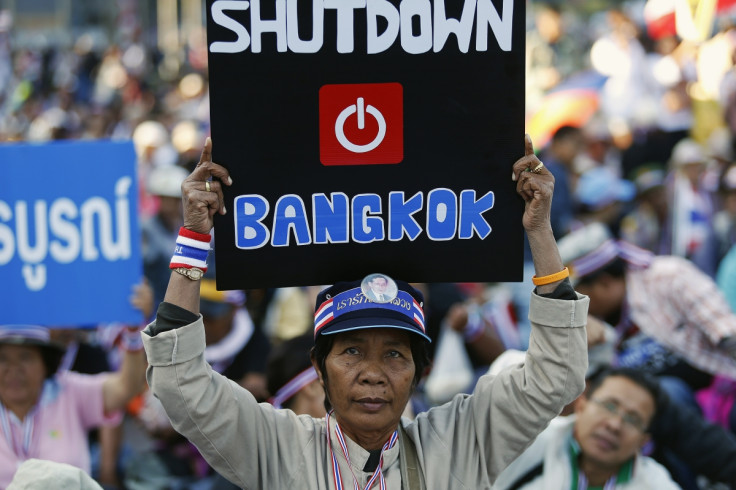Thai Anti-government Protesters Begin 'Bangkok Shutdown'
Authorities to declared state of emergency if situation worsens

Anti-government protesters in Thailand have begun demonstrations across the capital in a bid to bring the city to a standstill, a move they call as "Bangkok Shutdown".
Protesters belonging to the People's Democratic Reform Committee (PDRC) have started blocking traffic in key areas of Bangkok and more roads are likely to be closed as the day progresses.
The demonstrators, wearing T-shirts with the slogan "Bangkok Shutdown", are also pitching camps in some parts to stage sit-ins. Besides, barricades are being erected at key road intersections to block the traffic.
Opposition leader Suthep Thaugsuban, who is leading the anti-government rallies, is in the forefront of a large procession from the Democracy Monument to the protest sites.
"I want to announce on this important night that the masses will not accept any proposals or negotiations. In this fight, defeat is defeat and victory is victory. There is no tie. There's no win-win. There's only win on one side," Suthep addressed his supporters on the eve of the shutdown.
The campaigners have also vowed to cut off power supply and prevent government officials from working, as part of the shutdown.
Interim Prime Minister Yingluck Shinawatra, against whom the rallies are taking place, has arrived at the defence headquarters to monitor the situation. Yingluck is also the caretaker defence minister.
The government has deployed 18,000 security forces across the capital to avoid any untoward incident. The authorities are likely to declare a state of emergency if the situation worsens and have warned against any violence.
The clashes in the Southeast Asian nation have claimed eight lives, including that of a police official, in the last two months.
Thailand has been grappling with serious anti-government protests that forced the prime minister to dissolve parliament and call for fresh elections on 2 February.
The anti-government protests were originally set off by a controversial amnesty bill which might have allowed Yingluck's brother and former leader Thaksin Shinawatra to return from his self-imposed exile.
The anti-government protesters have been demanding the exit of the present government and an unelected "People's Council" to break the political logjam.
© Copyright IBTimes 2025. All rights reserved.






















